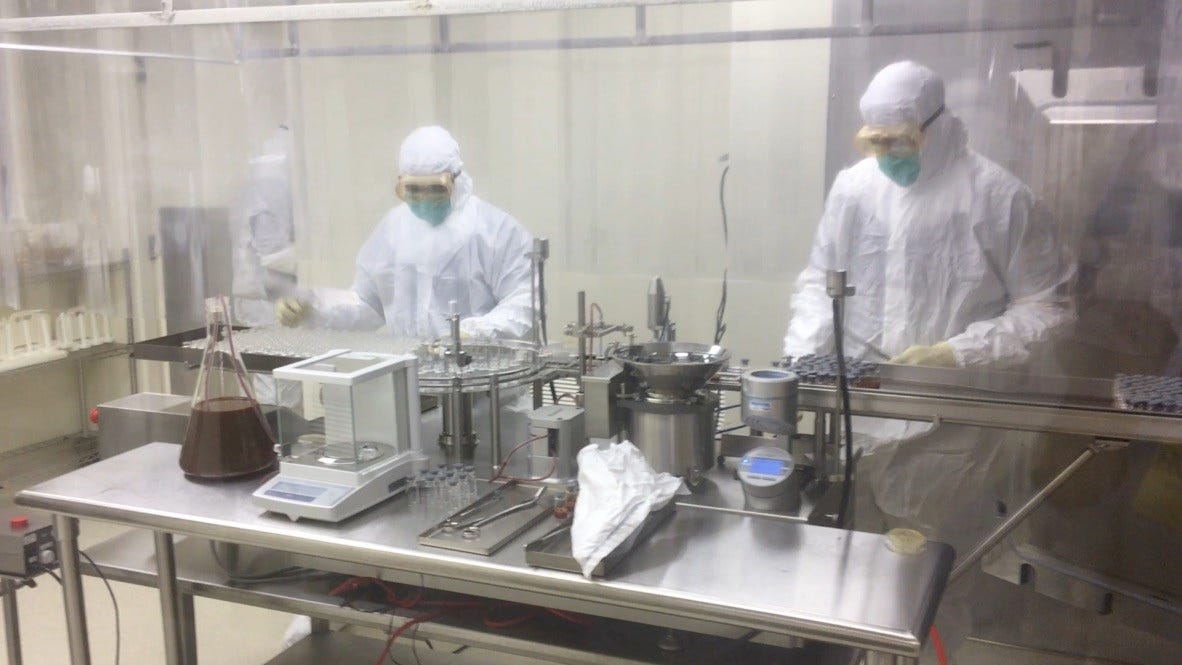New Data Puts FAST BioMedical ‘On the 15-Yard Line’
 FAST employees manufacture the injectable
FAST employees manufacture the injectable
Subscriber Benefit
As a subscriber you can listen to articles at work, in the car, or while you work out. Subscribe NowDoctors in critical hospital settings make judgement calls—sometimes life or death decisions—based on information, but there’s one stat that has been notoriously difficult to obtain, says Carmel-based startup FAST BioMedical. Doctors are clamoring for a better way to determine a patient’s blood volume, an important measurement that can dictate treatment in the critical care setting. Recently validated by clinical trial data that’s “as good or better than we ever thought it could be” and publications in national journals, FAST Biomedical is confident its technology will soon save lives.
Blood volume, also referred to as fluid status, is the amount of blood flowing through a patient’s intravascular system. Blood volume measurements are especially critical for patients with heart failure or sepsis, a life-threatening condition. The Centers for Disease Control and Prevention (CDC) says one in three patients who die in a hospital has sepsis, and the condition kills about 270,000 Americans each year. Blood volume is also vital information for patients with cardiorenal disfunction.
“I’ve heard enough stories from clinicians where they’re doing the best they can with some pretty crude metrics, and in some of these very complicated patients, it just goes the wrong way,” says FAST BioMedical Chief Executive Officer Joe Muldoon.
FAST BioMedical’s technology combines an injectable and device to provide precise measurements for blood volume and kidney function. Doctors inject patients with a small dose of a proprietary fluorescent solution, then take timed blood samples. The samples are processed in a device that measures the concentration of the fluorescent marker in the blood and runs it through algorithms to calculate the blood volume within 45 minutes.
Recent results from a Phase 2B clinical trial were “so good” they’ve been published in peer-reviewed medical journals and are “enabling a lot of conversations,” says Muldoon.
“We were able to show in our trial that we could take all different kinds of patients, administer fluid to them, and we could literally follow it with our technology—what that fluid did to their overall blood or fluid level,” says Muldoon. “To our knowledge, nobody has ever been able to demonstrate that before. It followed it very precisely; the technology was accurate and reproduceable, and it was over different types of patients. That was dramatic.”
It’s a milestone for the company, says Muldoon, marking one of its most significant achievements “in our entire decade of work.”
“People are, literally, coming out of the woodwork and calling us,” says Muldoon. “The data’s really good; it shows that not only is [the technology] accurate and safe, but we can measure things nobody’s ever been able to measure.”
With a long list of Indiana investors, the startup has raised $31 million, and is planning Series B funding next; Muldoon notes raising capital is especially difficult “if you’re not a therapeutic” (drug).
“If you’re pre-commercial in the med tech space, it’s just a challenging environment to raise capital,” says Muldoon. “It feels like we’ve turned the corner with this data; now we’re taking more incoming calls than having outgoing calls, but it’s still hard.”
While there is an existing method to measure blood volume, it uses an expensive radioactive nucleotide; the method has not seen commercial adoption and has been limited mostly to research. Muldoon says doctors want a clinically viable method to determine blood volume that’s easier to use, cheaper and focused on patients, “and our technology gives them that.” The startup believes it could be on the market in about three years.
“I think our technology is going to improve the lives of patients and even save some lives,” says Muldoon. “It’s good to be on the 15-yard line, but we don’t celebrate until we’re in the endzone.”
Muldoon says the company has tweaked its market approach to lower the cost of adoption for hospitals.
Muldoon says the startup has brought on new key investors who are experienced in injectable and device combination products.
